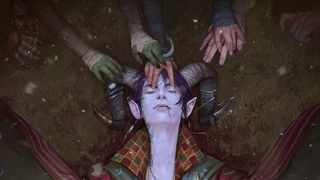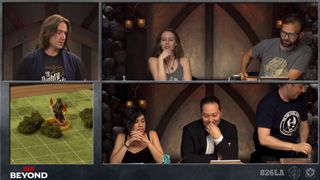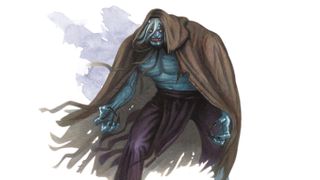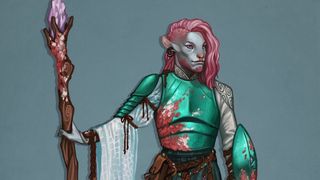Permadeath and D&D: The pain of losing a character, and why it can be great
Critical Role's Matthew Mercer and Taliesin Jaffe share stories and advice about dealing with player character deaths.


This article covers the events of Critical Role Campaign 2 episode 26 and beyond.
With a cast of professional actors flitting in and out of character during lengthy D&D livestreams, Critical Role is prone to ambiguity. Viewers can't always distinguish between in-character emotions and real ones, which in one case led some fans to believe that two players were actually arguing over a magic bowl (they weren't). But when player Taliesin Jaffe excused himself from the room during an episode, that ambiguity fled from the table for the first time in the campaign. There was no roleplaying for him to do, because his character was dead.
Twitch chat was inconsolable. A scripted show would probably not have casually rolled Jaffe's character, a carnival performer named Mollymauk and a favorite subject of cosplayers and fan artists, into a shallow grave just 26 episodes in. And neither would that show include a scene in which the actor is told they've been written off. (Jaffe has since returned with a new character, of course.)
It was heartbreaking, but chance is partly what makes Critical Role and other tabletop gaming shows alluring. When the livestream begins every Thursday evening, not even many-voiced dungeon master Matthew Mercer (who you may recognize as the voice of Overwatch's McCree, for one) knows precisely where the adventure will go, or if everyone will survive.
I spoke with Mercer and Jaffe over Skype about what it's like to die (and tell someone they've died), how they handle permadeath in their D&D games, and what advice they have for others who want (or don't want) to deal with death in tabletop roleplaying games.

What it feels like to kill and die (but pretend)
I can only think of two reasons one might have to inform someone that they're dead: either you're Charon, ferryman of Hades, or you're a DM. While it's part of the game in D&D (at least if the group allows it to be), there's no inherent joy in telling a player that a character they've spent months or even years developing is gone, and that until they're resurrected or return with a new character, the game is over for them.
It's an intense feeling, but not an uncomfortable one.
Taliesin Jaffe, on his character's death
Mercer and Jaffe's friendship wasn't going to suffer over dice rolls, but Mercer says he did feel guilty narrating Molly's death, which came after a series of unfortunate rolls during a planned but nevertheless dangerous assault based on shoddy information. Jaffe had been playing Molly every week (except one) since early January, when Critical Role's second campaign began. Prior to that, he'd been thinking about the character for a year and a half, composing a personality based on real people he's known, including some who have died. In narrative-heavy campaigns like Critical Role's, characters are more than stats, and Mollymauk was an extension of Jaffe's experiences and values.
"The first few times I had [a character die], it was in shorter games in high school so they were less sophisticated," says Jaffe. "And eventually once I started playing with people who were really getting their storytelling chops out, and it became less of a math game and more of a storytelling game, it got a little heavier."
The biggest gaming news, reviews and hardware deals
Keep up to date with the most important stories and the best deals, as picked by the PC Gamer team.
"It's an intense feeling, but not an uncomfortable one," he says. "Having a bit of real death in one's reality, especially people closer to your age, you begin to learn what that process feels like for you. It's interesting."
The good thing about fictional characters, says Jaffe, is that they don't really die—Molly lives on in his head. For Mercer's part, he's dedicated to checking in with players and treating their emotions seriously. It may be a game, but D&D is a heavy commitment. Inhabiting a character for hours every week—and bonding with friends through them—is not nothing.
But despite his own grief over ending a character whose adventures he'd been narrating for months, letting Mollymauk live by way of some magical intervention wouldn't have been conducive to the kinds of stories he and the players are after—stories with risk, loss, and change, where the narrative is unbound by computer programming or the predetermined future of a script.

Should your D&D game include permadeath?
At higher levels, it becomes tough to really die in vanilla D&D 5e, so long as your party is prepared to bring you back from the dead. But a DM and party who want to incorporate more risk can tweak the rules however they like to make death come easier, or resurrections more difficult. Why do it, though? Jaffe was clearly upset in the moment, the other players were near-speechless, the Critical Role viewers were upset, and Mercer's narration of the death didn't exude 'fun.'
I would never have guessed circumstances would allow them to be this utterly loathed, and that's weirdly delicious.
Matthew Mercer, on the villain
It's appropriate that one of Mercer's favorite videogames is Darkest Dungeon, a merciless adventure which is pleased to eviscerate your best-trained fighters. But how often in a videogame do you get to witness your friends say a few words over your corpse, or come back in a new form to find them mourning you? Permadeath in videogames typically means that a party character—someone you wouldn't consider 'yourself,' such as an XCOM soldier—has died, or that the game is over and you've got to restart. It can be a big deal, but I've yet to play a digital game in which death is as consequential as it can be in a tabletop roleplaying session.
For starters, the killing created the campaign's greatest villain so far. They became someone the players, their characters, and the audience all had an uncomplicated reason to despise, aligning fiction with meta-fiction.
"I designed [the villain] to be a really hateful character," says Mercer, "but I would never have guessed circumstances would allow them to be this utterly loathed, and that's weirdly delicious. It's one of the positive benefits of this scenario, if there are any to take out of it through all the grief and sadness and emotional turmoil that comes through the loss of this character."

Having a vicious temporary villain was a boon to Critical Role's story, which had until that point primarily consisted of odd jobs and hints of evils we'll get to later. On top of that, the crisis of permanent loss is an obvious catalyst for character development. Mercer has been thrilled by the improvisational acting that resulted from Molly's death.
"This group of morally-dubious fuck-ups," he begins, "seeing their characters change, their morals shift, their focus and priorities realign based on their memory of this person who had changed their life in ways they thought were insignificant, but now that they're gone, they realize are much more impactful. It's such beautiful storytelling that none of us could have anticipated, and that's kind of the thrill of Dungeons & Dragons and the thrill of this campaign for us."
The players are now doing recon missions, and they're gathering intel on what they're up against, and it's been kind of a cool change in tactics based on how they've been playing up to this point.
Matthew Mercer
I ask Jaffe how it felt to watch his own funeral during the next session. "I had hopes," he says, "and it's interesting to watch your friends [react]. You don't have a conversation with them about it, and to have hopes of what you're going to see and then to get to see it … It was the impact I was hoping to have on the group, and it was nice to know I had it without having to feed it to my friends, which you never want to do."
Molly's death changed how the players play, too, as well as how their play is interpreted. Recklessness now indicates that a player is dead certain their character would behave recklessly in a given situation, whereas when mortality hadn't been directly experienced, risky playfulness didn't feel nearly as bold. Every encounter is heightened, and as a viewer it's been fun to watch the party fumble through its newfound sense of fear and caution, balancing hesitation with a desire to act—it looks fun to play, as well.
"Sometimes, especially when you're used to your actions in the game not having any serious weight, scenarios like this can help remind players, and me as well, that a little bit of intel, a little bit of additional research, a little bit of acquisition of information beyond what you currently know could aid those elements of survival," says Mercer. "And when things begin to turn, or surprises show up in the game, things that you weren't able to ascertain, not every battle should be fought to its bitter end. Sometimes it's better to flee, take the knowledge you've learned and then come back later with better preparation, and we're starting to see that in the episodes since it happened. The players are now doing recon missions, and they're gathering intel on what they're up against, and it's been kind of a cool change in tactics based on how they've been playing up to this point. It's been a really exciting thing to watch from my standpoint."
"Now they're playing smart," says Jaffe.
When should you kill a player character?
Death can be a radical twist that challenges both players and the DM, but an obvious bit of advice: Before you stick a halberd through someone's chest, make sure your players are OK with dying, and warn them of the risk often. Mercer says he reminded the party multiple times that, while they were practically "demigods" in their previous campaign, death was a real possibility in the new campaign with low-level characters. "And like good players, we all went 'yeah, yeah, yeah, sure, sure,' and then didn't work out a replacement character at all because we're gods," says Jaffe, laughing.
Even if everyone's on board, though, when should the DM make the killing blow? When Molly fell unconscious next to the party's future villain, Mercer hardly hesitated before narrating the consequences, despite there being a good deal to consider. Would the villain kill someone who's unable to fight back? It turned out yes. But on top of that, the team was playing with guest star Ashly Burch, as two regular players were away for personal reasons. They had no healer. Curious if he sometimes muddles the numbers behind his DM screen, I ask Mercer how much he values consistency over forgiving bad rolls when a bit of clever roleplaying turns fatal, a joke goes bad, or variables outside of the game create imbalances.
"It is kind of a dance," says Mercer. "For me, if I know the stakes coming are pretty serious, then I'll do my best to insinuate how serious the stakes are. And if a player is treating it flippantly, then I will allow them to continue to do so, but will also reiterate that your actions in this situation might lead to dire consequences. I'll try and subtly put that in there, but ultimately it's still the player, it's up to what they do."


Twitch chat makes an effort to psychically influence Critical Role as it happens, and I wondered if the pressure of all those eyes is felt by Mercer and crew as they play. "Only after the fact," says Jaffe. "I can't think about what's happening outside the game during the game at all. And then, once I'm out of the room, I'm like, 'Oh man, I don't even want to look at Twitter for a week.'"
"Yeah, we've done a very good job from the very beginning to try to insulate our game experience from the larger entertainment scope when we're at the table," says Mercer. "There are cameras there, but we've gotten used to it, and it's still just us at the table interacting with each other and playing the game and telling the story for each other. So in those moments, yeah, we're not even thinking about the wider ripples of how this will affect people. We're thinking about how it'll affect those at the table."
It's important to Mercer that the group never feels pressured to change the way they play based on how viewers respond, but he says they do have a responsibility to check in with fans, "helping those we can help," and being understanding even with those who take out anger on him. (Unless they direct their anger at someone else in the community, in which case he's "protective as shit.")
And just because death is possible doesn't mean it always needs to be permanent. Anything can happen (it's imagination land, you know). Mercer says his decisions follow a simple rule: Do what will make the game fun.
"Ultimately, the point of Dungeons & Dragons is for everyone to have a good time, for everyone to have fun and feel fulfilled at the end of their experience," he says. "If the party wants to play a super hardcore nightmare-mode Diablo-style game, then that's fine. But more often than not, people are invested in their characters and the long-form narrative, invested in the challenges before them and their character growth. If the rules of death begin to negatively impact that experience, then you need to think from a dungeon master standpoint what's more important to you: sticking stringently to the rules, or your players having a good time."
Mercer notes that a character's death can come from his own bad planning just as it can come from a player's risky decisions, and regardless of how it happens, if it "doesn't feel narratively fulfilling" or generally isn't fun, he says he'd likely adapt the campaign's future and relax on the 'perma' part of the deal. Were the worst to happen in one of his campaigns—a total party wipe—he has a few ideas about how he'd handle it.
"I would consider creative ways to give them the opportunity for a few of [the characters] to come back," says Mercer, "whether that be the classic hero spirits climbing back from the underworld to return, or everyone creates a new party of adventurers that are now tasked to recover the corpses of the last party, or having a whole adventure that is in the afterlife and them trying to prove themselves worthy of resurrection to a god. You know, there are many ways to complete the narrative and give them the opportunity to return if things go bad without having to bend the scenario in the moment where it seems like a deus ex machina manages to prevent them from suffering the consequences."
Being a DM is hard (I've tried it, and it was hard). There's tons of valuable advice for new game runners out there, but Mercer's view on death (which isn't unique but well-put), offers a good guiding principle: Maintain consistency in the moment, but adapt the story in the long term to keep it fun. If your players can handle loss and it makes the game better, which it may have in Critical Role's case (as much as fans mourned the jaunty tiefling they'd just begun to know), then take it from there. If it makes the game worse, or unfun for a certain player, then send the rules to hell instead and find a creative way to build a future that's fun for everyone.
Critical Role airs Thursdays at 7 pm Pacific on Twitch, and past episodes are available for Twitch subscribers and on YouTube.

Tyler grew up in Silicon Valley during the '80s and '90s, playing games like Zork and Arkanoid on early PCs. He was later captivated by Myst, SimCity, Civilization, Command & Conquer, all the shooters they call "boomer shooters" now, and PS1 classic Bushido Blade (that's right: he had Bleem!). Tyler joined PC Gamer in 2011, and today he's focused on the site's news coverage. His hobbies include amateur boxing and adding to his 1,200-plus hours in Rocket League.
Most Popular

